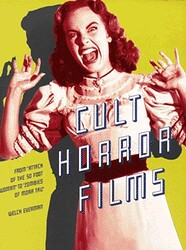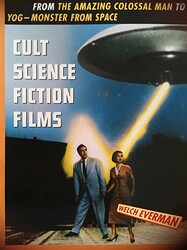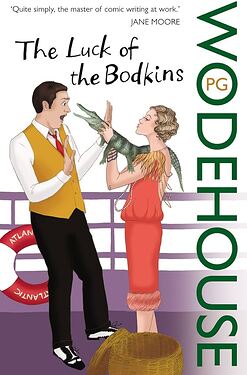Got to love those dog whistles…
Norman French culture, as interpreted by Walter Scott.
Just finished Maeve Higgins’ excellent essay collection, Tell Everyone On This Train That I Love Them.
Now I’m gonna read Klara and the Sun by Kazuo Ishiguro (who wrote Remains of the Day, etc).
I’m reading The God Particle: If the Universe Is the Answer, What Is the Question? by Nobel Laureate Leon Lederman and science writer Dick Teresi. The subject is the Higgs boson that was discovered at CERN in 2012 and confirmed by 2013.
It’s out of date, being published in 1993; however that doesn’t stop it from being an engaging book, with lots of the history of physics which I enjoy immensely, not to mention theory up to 20 years ago. It assumes the Higgs hasn’t been discovered yet, and that it would be once the Superconducting Supercollider was finished, instead of being canceled by idiot congressmen looking to save money to spend on the military.
But it’s also incredibly funny for a science book (that is if you enjoy puns, silliness, and the occasional LOL joke). For example, when discussing Pythagoras, Lederman refers to a story told by a student who’d suffered army basic training. A sergeant lectured privates on the metric system:
Sergeant: In the metric system, water boils at ninety degrees.
Private: Begging your pardon, sir, it boils at one hundred degrees.
Sergeant: Of course. How stupid of me. It’s a right angle that boils at 90 degrees.
The author also says that he started as a chemist but switched to physics because it was easier, but that “some of my best friends talk to chemists.”
I’m only about a quarter into the book and having much fun.
Just read The Machine Stops - by E. M. Forster.
It’s an interesting short story from 1909 that has an eerie resonance with modern times - especially since the pandemic.
There’s no pandemic in the story, but everyone sits in their own homes, out of shape, only communicating via a handheld communicator, constantly dealing with notifications and requests to review things, and having everything they need delivered.
As well as Forster’s predicting globalisation, the internet, video conferencing, and other aspects of 21st-Century reality, Will Gompertz writing on the BBC website on 30 May 2020 said "The Machine Stops is not simply prescient; it is a jaw-droppingly, gob-smackingly, breath-takingly accurate literary description of lockdown life in 2020.
“The clumsy system of public gatherings had long since been abandoned”, along with touching strangers (“the custom had become obsolete”), now considered verboten
– The Machine Stops: Will Gompertz reviews EM Forster's work ★★★★★ - BBC News
I wonder how the author would react to today’s world.
I just re-read The Red Pony. I last read it probably in 2007.
A short book with no plot. Back in 2007 I described the book to a friend as a 50-page long haiku. I still highly recommend it, but it is definitely not one of Steinbeck’s mature works — sometimes the writing becomes a little too creative and feels unnatural.
I swear in the version I read at that time the story of Nellie and her foal was the last chapter.
I just re-read Of Mice and Men for the first time since high school. I got more out of the story this time.
Our class was probably supposed to labor our way through the book for two weeks, but I had read it entirely in two days. I can’t remember what my opinion of the book was at the time — other than I found the writing style engaging and I enjoyed it. This reaction was the exact opposite I had to The Scarlet Letter.
I have a feeling the version we read in high school was bowdlerized. I can’t remember all the talk of whorehouses, nor the blatant portrayals of racism. The leather glove containing Vaseline, however, was definitely present.
I also wonder if the political aspect of the story was toned down — the simple desire of farm laborers to have their own place that can’t get thrown off of. A desire for dignity so strong that Crooks would be willing to work on the farm for no pay. As I read it this time I began to increasingly wonder if this book was the inspiration for Animal Farm.
George stood up. “We’ll do her,” he said. “We’ll fix up that little old place an’ we’ll go live there.” He sat down again. They all sat still, all bemused by the beauty of the thing, each mind was popped into the future when this lovely thing should come about.
George said wonderingly, “S’pose they was a carnival or a circus come to town, or a ball game, or any damn thing.” Old Candy nodded in appreciation of the idea. “We’d just go to her,” George said. “We wouldn’t ask nobody if we could. Jus’ say, ‘We’ll go to her,’ an’ we would. Jus’ milk the cow and sling some grain to the chickens an’ go to her.”
In my memory, the book was about George and Lenny. I now realize the book is a portrait of various people — including Curley’s wife — who dream of something they will never have.
You’re bringing back memories of “The Grapes of Wrath”, which we read in 10th grade Honors English.
H. Allen Smith met Faulkner, he wrote about it. My fave anecdote about WF is when he left a note for the studio he was working at in Hollywood, saying he was going home. Took a while for folks to remember he lived in Mississippi.
4 stories in todays Vulture on Octavia Butler:
I’m reading a serious film criticism volume by a Professor Welch Everman:
And you should see the back cover:
It’s a lot of fun. Some of the films he deems as worthwhile (for a cult horror fan) and some as junk. There’s a companion volume:
This I got some time ago at a SF con. I think I like this one better, but the back cover is not nearly as good.
I have almost finished reading “Across the River and into the Trees” by Ernest Hemingway. This might be his most self-indulgent novel, if you can imagine that.
I’m about 2/3 of the way through, and it seems utterly pointless. There has to be some kind of ending that renders the rest of the book profound. At least I hope there will be.
In this book Hemingway asks himself the age-old question — “What would it be like if I was a craggy old colonel in the US Army and I was dating a barely-legal chick whom I address as Daughter?” I can picture him rubbing his beard thinking very deeply about this issue.
With this conceit as the starting point, the book is made up of two things: an endless stream-of-conscience narrative inside the colonel’s mind, and endless conversations between the colonel and the young woman. That’s about it.
While reading this book I have regularly quoted William Riker when he said “how long can two people talk about nothing?”
So far this book seems to exist only to give Hemingway an excuse to do two things: praise Venice and disparage the various allied armies of the Second Wold War. That’s it so far. It’s all been wine, fish and “boy that Monty/Leclerc/Eisenhower was useless.”
The most interesting thing about the book is all the crude language. I had no idea the term “brown nose” goes all the way back to 1950.
I recently finished re-reading David Weber’s Empire From the Ashes trilogy. It’s military sci-fi.
From an interview the author did with SciFi Weekly in 2008:
…when I wrote Mutineers’ Moon, 15 or 16 years ago, the question that started to me going was “Assume that Earth doesn’t actually have a Moon, but rather a giant starship disguised as our Moon which has been there for at least 50 or 60,000 years. Where did it come from, why did it come here, and why hasn’t it left?” Answering those questions, built the book (and the foundation for its two—so far—sequels).
In a tiny nutshell: A 21st Century astronaut testing new NASA tech discovers that the moon is actually a powerful, intelligent interstellar battleship that has been orbiting Earth for over 50 millenia. When I say powerful: this ship, Dahak, is what the Death Star wants to be like when it grows up. Our hero must then find a way to end an ancient unresolved mutiny, and prepare Earth for the arrival of a massive alien fleet bent on wiping us all out... with no sign of reinforcements from Dahak's once-mighty fleet.
Available free from Baen: Empire From the Ashes Index Page
More recently, I TRIED reading H.G. Wells’ The Island of Doctor Moreau (my Kindle is loaded with public domain and free titles), but only made it a few chapers in.
I somehow only knew that the story involved an island and animals. After reading of Moreau’s cruel experiments on animals, I decided that book is not for me, even though I was probably past the worst parts of the story.
I’ve always liked Wells’ other works, but not Moreau…
I’m currently reading Someone Who Isn’t Me by Geoff Rickly.
Geoff Rickly’s debut novel Someone Who Isn’t Me is a feverish journey through the psyche of someone who no longer recognizes himself. When Geoff hears that a drug called ibogaine might be able to save him from his heroin addiction, he goes to a clinic in Mexico to confront the darkest and most destructive versions of himself. In this modern reimagining of the Divine Comedy, survival lurks in the darkest corners of Geoff’s brain, asking, will he make it? Can anyone?
I’m about a third of the way through and enjoying it so far.
Here’s an excerpt:
I forgot to mention that I finished reading “Across the River and into the Trees.” Yeah, it was that exciting.
The story’s ending came as no surprise. Hemingway had been hinting at it throughout the book. He died of a heart attack after duck hunting. There was nothing more to it than that.
It felt more like an exercise in writing rather than in story telling. And the writing wasn’t that good. To me it felt like someone writing a humorous parody of Hemingway — an exaggeration of his most clichéd subject matter and style.
I was disappointed. It was a really beautiful book. All glossy black, with Hemingway’s signature embossed in gold on the lower-right of the front cover. It was a first edition. Not that it is some rare museum piece. I bought it for $12 at the Strand.
Books published between the 1940s and 1960s have a very distinct smell. I enjoyed that at least.
On my recent train trip I read Dashiell Hammett’s “The Dain Curse” in my iPhone. It starts well, but drags in the second half.
Not quite as good as his previous novel — the non-stop wild ride of corruption, “Red Harvest.”
I have finished “the Heart of Darkness.” An arduous journey. Occasionally interesting.
The horror. The horror.
I’ve long had an interest in World War 1 and the zeitgeist of that era. Currently I am reading Tales of War by Lord Dunsany.
Edward John Moreton Drax Plunkett, 18th Baron of Dunsany, better (and more easily!) known as Lord Dunsany, is best known today for his fantasy stories. In Tales of War he put his masterful writing skills to work on a series of scenes describing the devastation of the first World War.
Dunsany served in that war, and came away with very strong memories and opinions.
The segment called An Imperial Monument describes a small part of the French countryside laid waste by the ambitions of the incompetent narcissist Kaiser Wilhelm II.
It struck me how Dunsany’s impression of the Kaiser so strongly mirrors what we see today in Donald Turmp (name deliberately misspelled here because I’m sure DJT would hate that).
This led me to a web search on the Kaiser, which led to a New Yorker article that draws parallels between Wilhelm II and DJT: What Happens When a Bad-Tempered, Distractible Doofus Runs an Empire? | The New Yorker
Excerpt from An Imperial Monument (Tales of War):
It may be some satisfaction to his selfishness to know that the monument to it cannot pass away, to know that the shell holes go too deep to be washed away by the healing rains of years, to know that the wasted German generations will not in centuries gather up what has been spilt on the Somme, or France recover in the sunshine of many summers from all the misery that his devilish folly has caused. It is likely to be to such as him a source of satisfaction, for the truly vain care only to be talked of in many mouths; they hysterically love to be thought of, and the notice of mankind is to them a mirror which reflects their futile postures. The admiration of fools they love, and the praise of a slavelike people, but they would sooner be hated by mankind than be ignored and forgotten as is their due. And the truly selfish care only for their imperial selves.
Tales of War is superbly written, as can be expected from Dunsany, but it is not a cheerful book.
(This book and many others by Dunsany are available on Project Gutenberg)
I’m reading Becoming Madam Secretary, by Stephanie Dray. Frances Perkins was FDR’s labor secretary and the first woman cabinet member. It’s fascinating historical fiction, describing Perkin’s struggle to end some of the worst exploitation (and injuring or killing) working people–including the Triangle Shirtwaist Factory fire, which Perkins witnessed.
P.S. Stephanie is a friend who was in our writer’s group years ago and was already a fantastic writer. She also fostered our two kittens, Nickel and Allspice before we adopted them.




